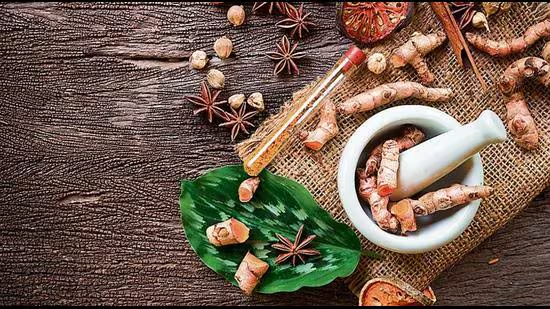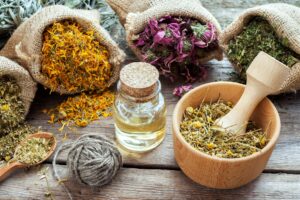
Immunity is our body’s natural defense, but strengthening it requires effort. Herbs have proven themselves useful at strengthening immunity.
Add one or more of these herbs to your diet, and be sure to source your vitamins and minerals through whole food sources instead of supplements.
Rosemary
Rosemary (Rosmarinus officinalis) is a beloved culinary herb known for enhancing immunity and improving circulation, as well as providing antioxidant protection from oxidative stress and supporting healthy cells. Animal studies have confirmed its effectiveness at protecting against bacteria and fungal infections as well as improving memory function, while its overproduction of oils that lead to dry scalp and hair has proven its use against dandruff shampoos as an ingredient. One 2020 study discovered rosemary oil suppressed activation of cancerous cells and prevented tumor growth!
Rosemary contains phenolic diterpenes that may help combat cognitive decline and boost the immune system, while its essential oil has been demonstrated to be effective at killing bacteria and viral agents, relieving pain relief, and acting as a natural decongestant.
rosemary is an excellent source of iron and calcium as well as vitamins A, C and B-6, making it a good addition to a nutritious diet. In high doses it may stimulate uterine contractions during gestation; pregnant women should therefore avoid high doses. Furthermore, larger dosages could interact with certain blood-thinner medications; it’s always wise to consult your physician prior to taking rosemary supplements for extended periods. Taking too much rosemary may lead to headaches, drowsiness and stomach upset – larger dosages could do just that.
Lemon Balm
Lemon balm (Melissa officinalis) contains an active antioxidant called rosmarinic acid that boasts antiviral, antibacterial and antifungal properties as well as soothing, sedative and antispasmodic benefits – according to research this can also relieve cold sore symptoms and extend time between herpes outbreaks.
Researchers have also discovered that lemon balm extract helps inhibit the replication of human herpes simplex virus and influenza viruses such as H9N2. Furthermore, its antiviral and anti-cancer effects help stop their proliferation while its sedative effects help soothe insomnia, depression and anxiety.
Coriander seeds (Coriandrum sativum) and oil contain coumarins, phenolic acids and sterols which strengthen immunity. A tincture made from seed extract may help treat herpes outbreaks as well as enhance mood, combat stress and enhance libido.
Add fresh or dried leaves of rosemary to herbal tea to soothe cold and flu symptoms and make for a relaxing beverage. Also try it in salads, marinades, fish recipes and fruit dishes for zesty flavors, natural skin care regimens or as a smear on cold sores to ease symptoms. It makes an attractive addition to cottage gardens and edible landscapes where it can be mixed in with vegetables and herbs; furthermore it attracts bees as pollinators as well as acting as natural mosquito repellent.
Thyme
Thyme belongs to the Wild Edible Plant (WEP) family and can be found throughout southern Europe. Packed full of phytonutrients and antioxidants such as phenolic compounds like thymol and carvacrol, this herb offers anti-inflammatory, antineoplastic and antiviral benefits.
Thymol and rosmarinic acid are the main constituents that give thyme its antimicrobial and antifungal activity, along with being rich in Vitamin A – helping prevent macular degeneration and cataracts as well as strengthening immunity through increasing production of natural antibodies and infection-fighting chemicals in the body.
Thyme can also provide relief for digestive ailments. Studies have demonstrated how extracts of this herb help protect stomach lining against ulcers and reduce acid production for better GI health. One research paper reported how its compounds, thymol and carvacrol, helped improve health among people suffering chronic digestive conditions such as Crohn’s disease.
Thyme oil contains anti-inflammatory properties and can help treat respiratory infections such as the common cold and bronchitis. It’s ideal for relieving cough associated with these conditions since it acts as an antiseptic, antibiotic and antifungal agent – you could even try adding some to a warm bath for relaxation and congestion relief! You could use thyme oil as mouthwash or add it to warm bath for relaxation or congestion relief.
Caraway
Caraway seeds (Carum carvi) are small, fragrant seeds of a biennial herb native to Europe, Asia and North Africa that belongs to the Umbelliferae family of parsley-related herbs such as carrots, cumin and celery. With their sweet-licorice taste, caraway is often added whole or ground into sweet or savory foods or used in making flavor-infused liqueurs.
Caraway seeds contain essential vitamins, minerals and antioxidants. One of the greatest advantages of supplementing with caraway is its antimicrobial properties which have been proven effective at fighting candida and E-coli infections. A study published by Journal of Pharmacy and Pharmacology also discovered that supplementation increased serum antioxidant levels among rats.
Other studies have demonstrated the potential benefits of caraway seed oil to treat digestive ailments such as gas, bloating, cramping and stomach inflammation. One such trial involving 39 participants who received enteric-coated caraway oil three times daily for four weeks experienced significant reductions in functional dyspepsia pain compared to their placebo group counterparts.
Caraway oil’s ability to suppress appetite, thus aiding weight loss, is another key advantage of taking 30 milliliters of 10% caraway oil solution daily for 90 days. A study published in Evidence-Based Complementary and Alternative Medicine discovered that those taking this supplement reported lower food consumption, carbohydrate consumption and body weight without altering any other aspect of their diets.




